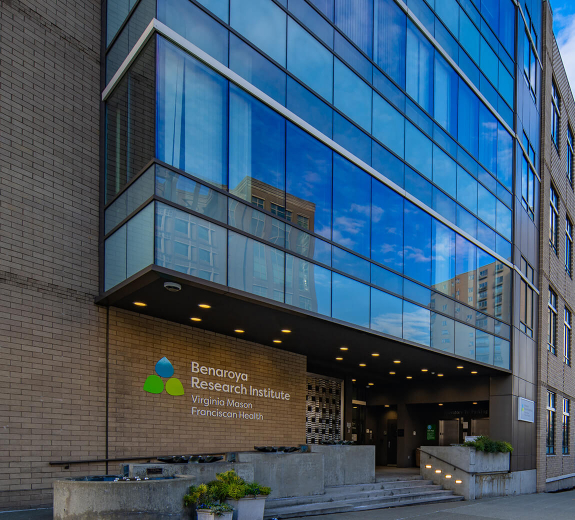In a new study published in the Journal of Allergy and Clinical Immunology led by Benaroya Research Institute (BRI) and Seattle Children’s Research Institute in collaboration with the University of Washington School of Medicine and the University of Wisconsin, researchers discovered why individuals with allergic asthma may have reduced susceptibility to COVID-19 and an important mechanism by which allergic inflammation diminishes SARS-CoV-2 infection, despite well-known susceptibilities to other respiratory viral infections.
Allergic diseases such as asthma are characterized by type-2 inflammation in the airways. BRI’s Naresh Doni Jayavelu, PhD, and the research team looked at mechanisms whereby type-2 inflammation in the airway surprisingly protects against SARS-CoV-2 in children. The study utilized bronchial airway cells from carefully characterized children with and without asthma obtained from the biorepository of Dr. Jason Debley, investigator at the Center for Immunity and Immunotherapies at Seattle Children’s Research Institute. The Debley Lab team then used the cells to conduct SARS-CoV-2 infection experiments in their biosafety level 3 (BSL-3) facility using an organotypic ex vivo airway epithelial model system. Results demonstrated that viral replication was lower in airway epithelial cells from children with allergic asthma compared to their healthy counterparts, and that increasing the level of type-2 inflammation in the epithelium could dramatically impair viral replication.
“This was a highly collaborative research effort that revealed important molecular and clinical insights by which people with allergic asthma are likely protected from SARS-CoV-2 infection,” said Dr. Jayavelu. “Early epidemiologic studies reported conflicting findings on the association of asthma with COVID-19 adverse outcomes. However, now we are seeing that it is other pulmonary disease (such as COPD) that confer risk for worse COVID-19, but surprisingly allergy and allergic asthma can confer unexpected protection.”
The findings also illustrate a notable mechanism of intrinsic protection against SARS-CoV-2.
“To my knowledge, this is perhaps the most compelling demonstration of a mechanism of intrinsic protection against SARS-CoV-2. We know antibody responses after vaccine or natural infection are protective, but this mechanism protects in the absence of prior exposure to the virus,” said Matthew Altman, MD, BRI affiliate investigator and co-author on the study.
Since the study findings are based on in vitro cell culture experiments, Dr. Jayavelu and Dr. Altman are now investigating to what degree type-2 inflammation decreases viral replication and severe disease in a large observational cohort that was enrolled at the beginning of the pandemic to more fully understand the clinical impact of their results.
This research was funded by the National Institute of Allergy and Infectious Diseases, part of the National Institutes of Health, and other sources. It builds on a previous study that set the groundwork for a hypothetical mechanism of protection. For more information on BRI and its asthma research, visit benaroyaresearch.org.



